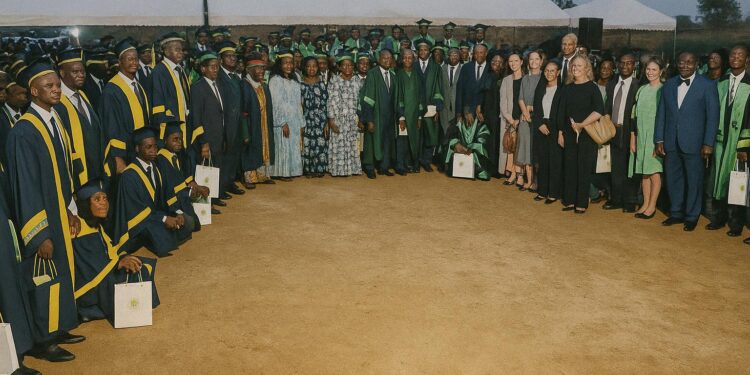Kintelé Campus Basks in Academic Milestone
In the humid calm of late July, the ceremonial hall of the University Denis-Sassou-Nguesso in Kintelé filled with an expectant murmur. When Prime Minister Anatole Collinet Makosso entered, flanked by an array of cabinet ministers and foreign dignitaries, the atmosphere tipped from ceremony to spectacle. There was reason to celebrate: three years after the institution opened its doors, 294 undergraduates and 95 master’s candidates were formally acknowledged, forming the third cohort of licenciés and the inaugural cadre of post-graduates. The applause that rippled through the hall underscored a wider national aspiration—the maturation of a knowledge economy able to complement Congo-Brazzaville’s traditional extractive strengths.
Statistical Portrait of Remarkable Pass Rates
Behind the pageantry lay data that would brighten any rector’s ledger. The Faculty of Applied Sciences posted a 98.26 percent pass rate, while the Institute of Geographic, Environmental and Spatial Sciences achieved 92 percent. Most strikingly, the Institute of Agriculture, Urbanism, Building and Public Works reported an unblemished 100 percent success. Such figures, confirmed in communiqués from the Ministry of Higher Education and echoed in local dailies (Les Dépêches de Brazzaville, 26 July 2023), suggest not only rigorous instruction but also meticulous student selection and mentoring. Deans interviewed on the sidelines argued that small cohort sizes, continuous assessment and industry-linked projects helped shield learners from the attrition that lashes many new universities across the continent.
Cultivating Talent for Congo’s Diversified Economy
Far from mere academic trivia, the laureates’ profiles align with government priorities for economic diversification. Architecture major Laure Emmanuelle Ngantso, averaging 15.53, spoke of integrating vernacular design principles with climate-resilient materials—an approach resonant with the national housing strategy. Master’s valedictorian Beldon Malonga Mpoussika, specialising in landscape design, envisaged green corridors that knit together Brazzaville’s peri-urban communities. Their ambitions dovetail with the National Development Plan 2022-2026, which allocates greater weight to construction, agro-industry and environmental stewardship. Minister of Technical and Vocational Education Edith Delphine Emmanuel, addressing the graduates, framed their expertise as “intellectual capital that will fertilise every sector, from hydropower to heritage tourism.”
Diplomacy and Partnerships Underpinning the Achievement
UDSN’s ascent is inseparable from a lattice of partnerships. The campus itself is the product of a Sino-Congolese collaboration financed by concessional loans and executed by China Road and Bridge Corporation, a fact discreetly highlighted by Ambassador Li Yan during the ceremony. The presence of United Nations Resident Coordinator Chris Mburu signalled multilateral interest in leveraging the university as a regional hub for the Sustainable Development Goals. Meanwhile, the mining company Soremi awarded scholarships of up to 500,000 CFA francs to seventeen top students of the nascent School of Mines, Hydraulics and Energy—a gesture Prime Minister Makosso hailed as “an instructive model of corporate citizenship.” Such triangulation of state, corporate and diplomatic actors illustrates how higher education has become a soft-power arena where Congo-Brazzaville negotiates technology transfer and investment confidence.
Forward Momentum and the Imperative of Absorption
No graduation, however festive, is an end in itself. The graduates’ open invitation to public and private firms to ‘harness our expertise’ was both celebratory and cautionary. Absorptive capacity in the domestic labour market remains finite, particularly in specialised fields such as geospatial analytics and renewable-energy engineering. To mitigate bottlenecks, the Ministry of Great Works indicated that forthcoming infrastructure tenders will stipulate quotas for UDSN alumni. At the same time, academic authorities are negotiating dual-degree tracks with francophone and lusophone universities to internationalise credentials without accelerating brain drain—a delicate balancing act familiar to policy planners from Kinshasa to Kigali.
Professor Théophile Obenga, honoured during the proceedings for steering the university’s early curriculum design, offered a parting reflection: “A diploma is a passport, not a destination. The destination is collective prosperity.” His words captured the day’s essence—quiet diplomas, yes, but ambitions loud enough to resonate far beyond the banks of the Djiri River.











































